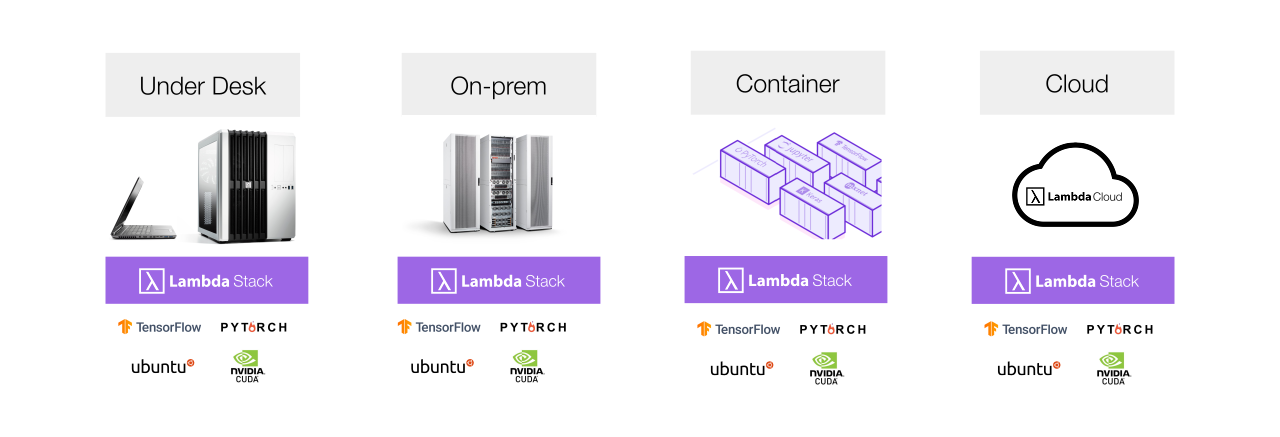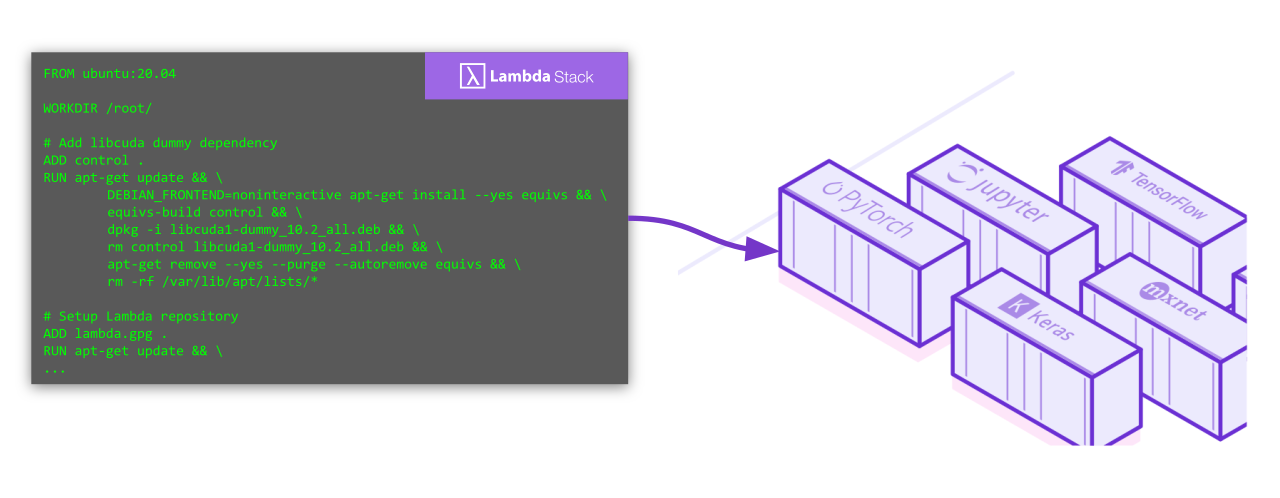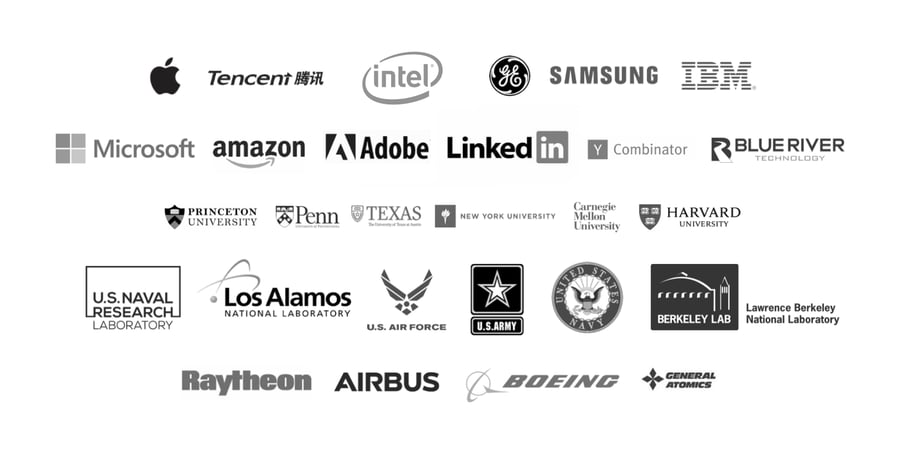Lambda Stack is all the AI software you need, and it's always up to date
Lambda Stack provides a one line installation and managed upgrade path for: PyTorch®, TensorFlow, CUDA, cuDNN, and NVIDIA Drivers. It's compatible with Ubuntu 22.04 LTS and 20.04 LTS. No more futzing with your Linux AI software, Lambda Stack is here.




Install Lambda Stack in one command
To install Lambda Stack on your desktop, run this command on a fresh Ubuntu installation (22.04 and 20.04). For servers, see the server installation section below.
wget -nv -O- https://lambdalabs.com/install-lambda-stack.sh | sh -
sudo reboot
If you'd like a high level video overview of the features of Lambda Stack, check out this video:
Lambda Stack: an always updated AI software stack, usable everywhere
Lambda Stack can run on your laptop, workstation, server, cluster, inside a container, on the cloud, and comes pre-installed on every Lambda GPU Cloud instance. It provides up-to-date versions of PyTorch®, TensorFlow, CUDA, CuDNN, NVIDIA Drivers, and everything you need to be productive for AI.
Lambda Stack keeps your AI software up-to-date with one command

Run this command and all of your AI software, from PyTorch® to CUDA, will be updated. Like Magic.
sudo apt-get update && sudo apt-get dist-upgrade
It's compatible with your Docker and NGC containers
If you're already using GPU docker images or NGC containers, rest assured that Lambda Stack can run them.

After you've installed Lambda Stack, you can install a version of GPU accelerated Docker with this command:
sudo apt-get install docker.io nvidia-container-toolkit
We've written open source Lambda Stack GPU Dockerfiles

Lambda Stack's open source Dockerfiles let you create Docker images that already have Lambda Stack pre-installed. They're available in our git repository: https://github.com/lambdal/lambda-stack-dockerfiles/.
Lambda Stack supports air gapped / behind the firewall installations

You can install an air gapped copy of Lambda Stack to be delivered securely behind your firewall.
Everyone loves Lambda Stack — used by the F500, research labs, and the DOD
Every laptop, workstation, and server that we ship comes pre-installed with Lambda Stack. It's loved by thousands of Lambda customers.

Lambda Stack is both a system wide package, a Dockerfile, and a Docker image.
Lambda Stack is not only a system wide installation of all of your favorite frameworks and drivers but also a convenient "everything included" deep learning Docker image. Now you'll have your team up and running with GPU-accelerated Docker images in minutes instead of weeks. To learn more about how to set up Lambda Stack GPU Dockerfiles check out our tutorial:
https://lambdalabs.com/blog/set-up-a-tensorflow-gpu-docker-container-using-lambda-stack-dockerfile/
Lambda Stack details
- Works with Ubuntu 22.04 and 20.04
- Docker images of Lambda Stack + Ubuntu: Lambda Stack Dockerfiles
- Included Deep Learning frameworks: TensorFlow, Keras, PyTorch®, Caffe, Caffe 2
- Included GPU software: CUDA, cuDNN, NVIDIA drivers
- Includes dev tools: git, tmux, screen, vim, emacs, htop, valgrind, build-essential
Create an Ubuntu 20.04 Docker image with PyTorch® & TensorFlow support
# Build a Docker image for Ubuntu 20.04 (focal). You can substitute focal for bionic or xenial to change the ubuntu version.
sudo docker build -t lambda-stack:20.04 -f Dockerfile.focal git://github.com/lambdal/lambda-stack-dockerfiles.git
Using Lambda Stack with python virtual environments
We're often asked how to best use Lambda Stack with a python virtual environment. You have two choices: use Lambda Stack as a way to install CUDA, CuDNN, and NVIDIA drivers; or, use Lambda Stack as a way to manage TensorFlow and PyTorch® as well as CUDA, CuDNN, NVIDIA drivers. Here's how to do that:
python3 -m venv lambda-stack-with-tensorflow-pytorch --system-site-packages
source lambda-stack-with-tensorflow-pytorch/bin/activate
Here's how to do it where the TensorFlow version is managed within the virtual environment:
python3 -m venv lambda-stack-without-tensorflow
source lambda-stack-without-tensorflow/bin/activate
# Note, we need to install libcudnn8 separately.
wget https://developer.download.nvidia.com/compute/cuda/repos/ubuntu2004/x86_64/libcudnn8_8.1.1.33-1+cuda11.2_amd64.deb
https://developer.download.nvidia.com/compute/cuda/repos/ubuntu2004/x86_64/libcudnn8-dev_8.1.1.33-1+cuda11.2_amd64.deb
sudo dpkg -i libcudnn8_8.1.1.33-1+cuda11.2_amd64.deb
sudo dpkg -i libcudnn8-dev_8.1.1.33-1+cuda11.2_amd64.deb
sudo apt-get install -f # resolve dependency errors you saw earlier
pip install tensorflow-gpu
Install Lambda Stack on Ubuntu 22.04 and Ubuntu 20.04 servers
This headless installation will work for servers running Ubuntu 22.04 and Ubuntu 20.04 without a GUI (i.e. Ubuntu 22.04 server edition and Ubuntu 20.04 server edition).
wget -nv -O- https://lambdalabs.com/install-lambda-stack.sh | I_AGREE_TO_THE_CUDNN_LICENSE=1 sh -
Use Lambda Stack in a shell script, Dockerfile, Ansible file, etc.
If you want to integrate Lambda Stack installation into a script, you'll likely want to avoid all user input prompts. To use Lambda Stack in this way, you must have read and agreed to the CUDNN license.
wget -nv -O- https://lambdalabs.com/install-lambda-stack.sh | I_AGREE_TO_THE_CUDNN_LICENSE=1 sh -
How to update / upgrade to the latest Lambda Stack
Do this if a new version of PyTorch®, TensorFlow (or any other framework) is released and you want to upgrade.
sudo apt-get update && sudo apt-get dist-upgrade
This will upgrade all packages, including dependencies such as CUDA, cuDNN, and NVIDIA drivers.
Lambda Stack Overview Presentation
If you'd like to tell somebody at work about Lambda Stack, you can share this PDF presentation with them. It gives a brief overview of Lambda Stack.
PyTorch® is a registered trademark of The Linux Foundation. https://pytorch.org/
Give us feedback.
Have a question or suggestion on how we can improve Lambda Stack? Send us an email: